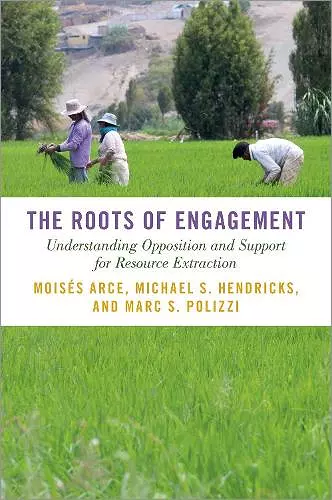The Roots of Engagement
Understanding Opposition and Support for Resource Extraction
Moisés Arce author Michael S Hendricks author Marc S Polizzi author
Format:Hardback
Publisher:Oxford University Press Inc
Published:21st Dec '22
Should be back in stock very soon

In recent years, emerging economies in the Global South have increased the overall demand for raw materials and bolstered the price of oil, minerals, and other commodities. As a result, resource-rich countries in Latin America and Sub-Saharan Africa have experienced an important economic bonanza and reduced levels of poverty and inequality. However, for communities living near the extractive frontier, mining has caused serious environmental degradation, and many in these communities have protested local extractive industries. Departing from the existing literature, The Roots of Engagement examines the individual-level factors that shape a person's opinions over resource extraction. It looks at what makes some individuals accept extractive activities close to their homes, while other individuals strongly reject them. Moreover, it asks why some individuals focus on the potential benefits of employment and local development, while other individuals focus on the defense of livelihoods and the ecological risks associated with mining. Moisés Arce, Michael S. Hendricks, and Marc S. Polizzi find that an individual's level of social engagement--defined by a person's participation in local organizations--is critical for understanding these differences. The greater the participation in local organizations, they argue, the greater the rejection of proposed mining activities. This individual-level approach unveils the fluidity of attitudes over resource extraction, even in areas that appear uniformly opposed to mining; the processes of attitude formation rooted in micro-politics and collective behaviors; and a cross-regional perspective on campaigns against mining. Based on three original public opinion surveys and interviews conducted in Tía María in Peru, Fuleni in South Africa, and Rancho Grande in Nicaragua, The Roots of Engagement is the first book to measure social engagement in organizations and its connection to attitudes about extraction and development.
This book provides a novel perspective to the study of the conflicts that surround resource extraction. The authors offer a novel hypothesis to explain individual views that focuses attention on how participation in social organizations shapes preferences. As one of the first books to make extensive use of polling in the study of extractive conflicts, it contributes unique evidence. All scholars interested in the politics of natural resources should read this book. * Matthew Amengual, Associate Professor in International Business, University of Oxford *
Arce, Hendricks, and Polizzi have crafted an important contribution to our understanding of the dynamics of extractive conflicts. They bring much-needed attention to the lives of ordinary people who live near mining areas, exploring how people are affected and how they make up their minds about a project. Combining original surveys with fieldwork, this book is a great example of mixed-methods research. I am delighted to see this kind of work joining the conversation on extractive conflicts and can't wait to assign it in my classes. * Carew Boulding, Associate Professor of Political Science, University of Colorado at Boulder *
The opposition of communities to extractive projects is now a familiar story. This fascinating book takes us inside those stories in a highly original way, focusing on individuals in the community and the micro politics of how their attitudes are formed, so that one accepts while another rejects the project. The claim that it is socially engaged citizens who are more likely to gain the knowledge and confidence to challenge a project that disrupts their communities is both theoretically elegant and empirically persuasive. * Kathryn Hochstetler, Professor of International Development, London School of Economics and Political Science *
The Roots of Engagement tackles seminal questions in the field of resource conflict. Offering a fresh take on the debate about who participates and why, the authors shift the unit of analysis to the individual level, where decisions about participation can be analyzed more precisely. This book should be read by everyone who wants to make sense of extractive sector struggles. * Rose J. Spalding, Professor of Political Science, DePaul University *
ISBN: 9780197639672
Dimensions: 163mm x 238mm x 19mm
Weight: 449g
216 pages